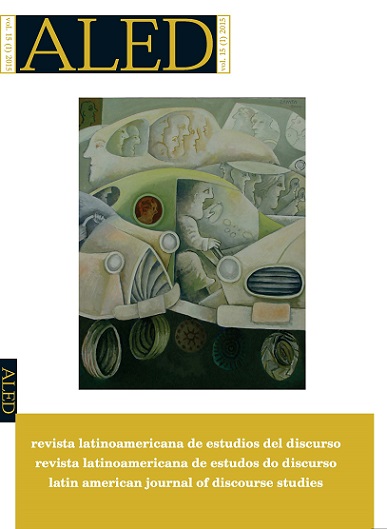Por un análisis feminista del discurso desde la diferencia sexual
Keywords:
feminist critical discourse analysis. post-structuralist discourse analysis. gender. radical feminism of difference. sexual difference.Abstract
The aim of this article is to identify the limitations of feminist discourse analysis. We have thus divided this article into two parts. In the first part we present the perspective of radical feminism of difference and its notion of origin, sexual difference. In the second part, we analyze the problematizations that emerge from feminist discourse analysis, primarily drawing on the assertions of two authors in this field: Lazar (2005) and Baxter (2008). One of the most relevant conclusions is that the notion of origin of Anglo-Saxon feminist analysis ”“gender”“ does not go far enough in terms of analysis and explanation. Furthermore, the epistemological premises of this analysis are not anchored in feminist theory per se. Finally, we present the foundational themes that shape the new feminist discourse analysis.
Downloads
References
Arendt, H. 2003. Entre pasado y futuro. Barcelona: Península.
Baxter, J. 2008. Feminist post-structuralist discourse analysis ”“ a new theoretical and methodological approach? En K. Harrington, L. Litosseliti, H. Sauntson y J. Sunderland (eds.), Gender and language research methodologies, pp. 243- 255. New York: Palgrave Macmillan.
Bengoechea, M. 1993. Adrienne Rich: Génesis y esbozo de su teoría lingüística. España: Ayuntamiento de Alcalá de Henares.
Bofill, M. (dir.). 1991. No creas tener derechos. España: Horas y horas.
Butler, J. 2007. El género en disputa. El feminismo y la subversión de la identidad. Barcelona: Paidós Ibérica.
Eichenbaum, E. L. y Orbach, S. 1988. ¿Qué quieren las mujeres? Madrid: Editorial Revolución.
Fairclough, N. 2008. El análisis crítico del discurso y la mercantilización del discurso público: las universidades. Discurso & Equidad 2,1: 170-185.
Femenías, M. 2003. Judith Butler: Introducción a su lectura. Buenos Aires: Catálogos.
Jeffreys, S. 1996. La herejía lesbiana. Madrid: Cátedra.
Jeffreys, S. 2003. Unpacking queer politics: a lesbian feminist perspective. Cambridge: Polity.
Lakoff, R. 1973. Language and woman’s place. Language in Society, 1, 2: 45-80.
Lazar, M. 2005. Politicizing gender in discourse: Feminist critical discourse analysis as political perspective and praxis. En M. Lazar (ed.), Feminist critical discourse analysis. Gender, power and ideology in discourse, pp. 1-28. New York: Palgrave Macmillan.
Lonzi, C. 2004. Escupamos sobre Hegel. México: Escritos de Rivolta Femminile.
Lorde, A. 2003. La hermana, la extranjera. Madrid: Horas y Horas.
Mills, S. 2003. [Disponible en línea en www.shu.ac.uk/schools/cs/teaching/slm/index.html]. Third wave feminist linguistics and the analysis of sexism. [Consulta: 1 de agosto de 2013].
Muraro, L. 1994. El orden simbólico de la madre. Madrid: Horas y Horas.
Pisano, M. 2001. El triunfo de la masculinidad. Santiago : Surada Ediciones.
Pisano, M. 2011. Deseos de cambio o… ¿el cambio de los deseos? Santiago: Editorial Revolucionarias.
Pisano, M. 2012. Julia, quiero que seas feliz. Santiago: Editorial Revolucionarias.
Rich, A. 1983. Sobre mentiras, secretos y silencios. Barcelona: Icaria.
Rich, A. 1996. Nacemos de mujer: la maternidad como experiencia e institución. Madrid: Cátedra.
Rich, A. 2001. Sangre, pan y poesía. Barcelona: Icaria.
Rivera, M. M. 1994. Nombrar el mundo en femenino. Barcelona: Icaria.
Rivera, M. M. 2005. La diferencia sexual en la historia. Valencia: Publicaciones Universidad de Valencia.
Savater, F. 2008. Ética como amor propio. Barcelona: Editorial Ariel.
Sendón de León, V. 2000. [Disponible en línea en www.mujeresenred.net] ¿Qué es el feminismo de la diferencia? [Consulta: 1 de agosto de 2013].
Sendón de León, V. 2002. Marcar las diferencias. Discursos feministas ante un nuevo siglo. Barcelona: Icaria. Violi, P. 1991. El infinito singular. Madrid: Cátedra.
Wodak, R. 2008. Controversial issues in feminist critical discourse analysis. En K. Harrington, L. Litosseliti, H. Sauntson y J. Sunderland (eds.), Gender and language research methodologies, pp. 193-210. New York: Palgrave Macmillan.
Woolf, V. 2003. Un cuarto propio. Madrid: Horas y Horas.
Downloads
Published
How to Cite
Issue
Section
License

This work is licensed under a Creative Commons Attribution-NonCommercial-NoDerivatives 4.0 International License.
The authors retain the copyright and guarantee RALED the right to be the first publication of the work as well as a Creative Commons Attribution License that allows others to share the work with recognition of authorship and the initial publication in this journal.




